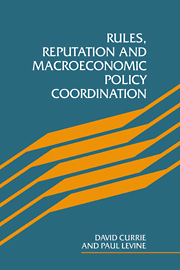Introduction
Published online by Cambridge University Press: 03 December 2009
Summary
Overview
This book brings together thirteen contributions written by the authors and collaborators in the general area of macroeconomic policy for open economies. The chapters appear essentially in their original published form. A number of typographical errors and some more substantive errors, discovered on rereading, have been corrected. In addition, in a few places material has been removed or added to avoid repetition and aid coherence.
The volume covers a broad area ranging from single open economy issues to games between national policy-makers. Nevertheless, a number of common features and themes link these selected contributions. First the models employed are ‘ad hoc’ and for the most part neo-Keynesian, displaying a short-run trade-off between output and inflation even where policy rules are anticipated. In all but one of the chapters we assume that exchange-rate behaviour obeys the uncovered interest-rate parity condition and that expectations in the foreign exchange market are rational in the sense that they are consistent with the predictions of the model. Thus the models we deploy can be broadly described as being in the Mundell-Flemming-Dornbusch tradition.
Apart from exchange-rate behaviour, the private-sector relationships postulated in most of our ad hoc models are clearly susceptible to the Lucas Critique. In using backward-looking equations with ‘constant’ parameters it may be argued that we ignore the crucial links between a change of regime and private-sector behaviour via private-sector expectations of future policy. Despite the success of rigorous models based on micro-foundations, it is by no means obvious that all areas of economic behaviour should be modelled as forward-looking and rational.
- Type
- Chapter
- Information
- Publisher: Cambridge University PressPrint publication year: 1993



